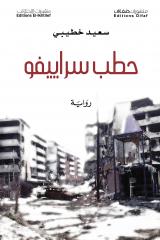Said Khatibi’s Firewood of Sarajevo is on the longlist for this year’s International Prize for Arabic Fiction, and it is both a novel and a transformation of wartime testimonies:
By Anissa Daoudi
Earlier this month, Firewood of Sarajevo (2019), a novel by the Algerian Said Khatibi, was selected for the 2019 longlist of the International Prize of Arabic Fiction (IPAF). Through the novel as a medium, Khatibi presents first-hand testimonies of two countries coming to terms with their traumatic past; the 1990s Algerian and the Balkan civil wars.
The novel was inspired, in part, by a 2018 workshop organized by me and Cherifa Kheddar, Director of the NGO Djazairouna, where we brought together survivors of the Algerian Civil war with writers, artists, psychologists, filmmakers and journalists. The objective was to translate first-hand testimonies into different media, including literature.
My involvement with Khatibi’s project came about earlier, in 2017, when I’d won a Leverhulme Fellowship to work on a monograph. In so doing I encountered two hurdles: one was related to the difficulty, if not the impossibility, of having access to survivors’ testimonies without being stopped by the regime for breaching the Amnesty Law (2005), which carries risk of a hefty fine and imprisonment for up to five years. The second hurdle was finding authors who would take this risk. At this time, I met Khatibi, who told me about his novel, which he’d started in 2013, before publishing his well-known novel Forty Years Waiting for Isabel. He had moved to live in Bosnia and learned the language. He said in a May 2017 interview that he made this decision after discovering, at the war museum, names of Algerians who’d fought for what was framed as the holy war “jihad.”
The names of the Algerians were the start of a journey Khatibi undertook to unravel two similar histories. The workshop served both projects, since we both agreed that narrating the stories of how people lived the wars in the two countries was an effective way of countering hegemonic narratives about the wars and documenting an alternative memory. When the novel was published, we discovered how much it meant to survivors. At the SILA book fair in 2019, survivors came to Khatibi’s book signing, proudly claiming the novel. One of them said it was the first time in her life she’d attended such an event. Cherifa Khedar, whose brother and sister were killed in front of her eyes at their family home in the 1990s, said in a 2019 interview that the novel opened new venues for her advocacy.
Khatibi’s novel, Firewood of Sarajevo, is about two countries separated geographically but united in traumas, as Bosnia and Algeria went through similar civil wars in the 1990s. Both cost the lives of thousands of people, the dead and the disappeared. The novel narrates the lives of two characters: Salim, an Algerian journalist, and Ivanka, a Bosnian young woman who run away from the war, seeking a place where she can write her dream play. Ivanka loses her father to the war, and Salim lives through the Algerian Civil War, where death is always around the corner, particularly for journalists and intellectuals whose names and the dates of their deaths are archived in the novel.
Khatibi’s novel can be read as a performative testimony, as a text which, though fictional accounts, provides testimonial evidence of the trauma experienced by the characters and by the broader Algerian society. The two characters’ testimonies meet through trauma, destruction, death, and writing. The narration of their stories of their lives reconstructs and performs the historicity of the two countries and brings to life atrocities of more than a decade, combating attempts of institutionalised amnesia.
The originality of Khatibi’s novel can be framed by two of its features. The first is that it is heavily based on research, archives from the Sarajevo Museum of war as well as first-hand testimonies collected at Djazairouna in Blida, Algeria. The second is the humanized nature of the characters, whose stories are real and need no embellishments. The stories represent the silenced narratives of real survivors, men and women who lived through the atrocities of the Civil War. The novel is a translation of testimonies that are not, as Khatibi argued in a 2018 interview, like “most what has been written in literature on the 1990s in Algeria so far was based on secondary sources. This is the first time the victim becomes a partner in the writing process. The writing workshop was an opportunity to retell the stories, and through those stories of real people, we transferred feelings, vulnerabilities, smells, tastes… My writing is about counter history, it is about filling the gaps…and what more do we have than gaps in the Algerian contemporary history.”
Firewood of Sarajevo is a practical move towards helping survivors own their narratives, and it furthers the objectives of Transitional Justice in a post-conflict setting. Firewood of Sarajevo is a concrete example of the agency of literature used by mnemonic community, “doing” alternative Transitional Justice.
Dr. Anissa Daoudi is a University of Birmingham academic. Her current project is on “Narratives and Translations of Sexual Violence against Women in conflict (Algerian Civil War of 1990s)”.
Click HERE to read more from this author.
You can publish this article on your website as long as you provide a link back to this page.



Be the first to comment